- Home
- L. R. Patton
The Dragons of Morad Page 5
The Dragons of Morad Read online
Page 5
No one says a word about what might happen if they should fail. If the prince escapes. If the king charges them all with treason.
These are wonderings for another day, perhaps.
Or perhaps they are not wonderings that belong in the hearts of parents at all.
The people, before the candle has burned to its bottom, review their plans. Not one of them refuses to follow.
They will do what needs to be done. Or they shall die trying.
THE king’s men search all morning to find Sir Greyson’s sword in the enchanted forest. He thought it unwise to tell the king what they had found and, last eve, merely returned to the castle gates, urging his men to keep their secret safe. They counted heads, and they had only lost one man, a soldier who had urged the rest to go, go, go, and he would take up the rear guard. He did not make it out of the forest, as far as they could tell. When Sir Greyson asked the men who had fled around him, they could not tell what it was they had seen, for they were focused on one purpose only: to get safely out of the woods, away from the dangers that lurked at every turn. And so they did. They rode faster than they have, perhaps, ever ridden in their lives. And the missing man remains a mystery.
The men, last eve, returned to the castle and slept the whole night in fear, and at the first light of dawn, they were up again, entering the woods to see what was left for them. Sir Greyson, truth be told, feels a coward for not remaining in the woods, by his sword, for his men search long and hard, in the direction they were sure they rode as the sun disappeared last eve, but they have found nothing, no sign of his sword, no hint of the children. He does not understand it. If he knew the nature of magic, perhaps he would. Magic, you see, is full of illusions and charm, and one can never know whether what one sees is real or merely a trick of the eye. And so the men say they rode south, but was it, in fact, east? Did they turn to the west? Where was the sun? Where is the sword?
Sir Greyson has nearly given up the search, for there will not be enough daylight left to trace the footsteps they will not be able to see anyway. And then a man gives a shout. Sir Greyson’s head snaps in the man’s direction. He is waving his captain to him. And there it is, his steel sword, sticking straight from the ground, its hilt pointed toward the dragon lands of Morad. It bobs side to side, as if the footsteps of a giant shake the ground. It does not appear so sturdy as it was last night. Was it moved? How would they know?
Sir Greyson hails his men. They stand looking at it. “The dragon lands,” says Sir Merrick. “We will never find them there. No man is permitted.”
“They are not permitted either,” Sir Greyson says. “Perhaps we shall find them on the perimeter.”
Though the words sound brave, Sir Greyson shivers down deep. He knows the rule of the land, that no man is allowed passage into the dragon lands. And what if the children have crossed the boundary? The king has ordered his men to search everywhere. Will Sir Greyson risk war with dragons to find the children? Sir Greyson has never seen a dragon, but he knows their might. The stories tell of it, though one might agree that stories sometimes do not capture truth so well as they capture fable.
Perhaps the dragons no longer exist. They have not been seen for many, many years, after all. Surely they would have been sighted if they still lived in these lands. Surely someone would have noticed.
Perhaps the stories were only stories, intended to keep children from wandering the woods. Sir Greyson knows, better than most, that stories such as these do not always keep children from the places that are said to hold danger. Sometimes it makes children more inclined to explore them. He himself had ventured into the woods one night when he was just a boy. He had always been curious and brave beyond his years. His mother nearly died at the sight of him emerging from between the trees. She raced straight to him, drawing him out even while he watched eyes lining up in the dark interior of the forest. He did not know to what they belonged. He had seen and felt the danger that night, and that was enough for him. He would never do it again. But what if his mother had not been there?
Sir Greyson and his men gaze at the sky. The sun is marching toward the west, but there is still plenty of daylight left. “We shall go,” he says. There are no footsteps for them to follow, and so the only proof they have as to where the steps so clearly led last eve is the direction of his sword. He knows that, without magic, one cannot turn the direction of his hilt once the sword is firmly entrenched in the ground, for the sword Sir Greyson carries is an enchanted one that can only be removed by him or his heir. The old woman might have had magic, but perhaps she did not think to change its direction. She did, after all, point out the footsteps in the first place, as if aiding them in their quest.
Sir Greyson retrieves his sword and slides it back into his scabbard, and then he and his men race through the forest, dodging the thickly positioned trees, racing the sun and the moon and all the dangers of the forest, racing their fear and their hope all in the same moment. They will have to camp in the dragon lands tonight, if there is no clearing, no relief from the forest, for once they reach the edge, there will not be enough light left in the day to ensure they make it back out of the Weeping Woods. Sir Greyson has not yet told his men. Would they continue their quest if they knew? He cannot not be sure. After losing one man to the forest, they all shake at its power.
His men ride, without a single complaint, with hardly a thought, for they are exhausted and desperate to find the children and, finally, rest. They do not consider what finding the children may mean, even the ones who have children of their own, for considering would mean a considerable crisis of decision, and these men only know that they are desperate to finish a quest. When a man has been searching as long as these have, it becomes difficult to remember what is right and what is wrong, what is good and what is evil. You would be surprised, dear reader, at the ways a mind can turn when one is exhausted and desperate.
Sir Greyson, like his men, merely wants an end to this never-ending search. He merely wants to know that life will return to what it once was. He merely sees what is right in front of his face: the approaching end, not the consequences of that end.
So it is that Sir Greyson and his men journey forth with no thought of what the king will do to the poor children they have been charged to capture and deliver. They think only of darkness and only of finishing and only of remaining alive long enough to eat a decent meal and sleep a decent sleep. They think only of doing this task which they have been given.
Rest. It will be so very good to rest.
Perhaps, dear reader, if the king had granted their respite, they might have made a decision that lined up with their ideals, one that would include letting the children escape, but, alas, we shall never know.
The woods grow darker as the men race their horses through it. The fairies begin their flight, dropping every now and again to touch a man on his back, but the men do not turn their faces any which way but the way that is before them. The ground shakes beneath the clap of hooves, and all the other creatures, winged and legged alike, remain hidden. Dusk will come soon, but the creatures of this forest know there is nothing for them in two hundred men racing through trees—nothing, that is, except their own trampled death.
So though there is only one sword that can fend off the creatures of this forest, should they attack, the terror of all the land’s stories remain in their tree homes and their underground holes and their secret caves, watching the men pass.
But Sir Greyson and his men must hurry.
Hurry, hurry, hurry.
And so this is what they do, on and on and on, until the sun is barely a shining sliver of gold above the edge of the horizon. It is at this very moment, the moment when the villagers of Fairendale used to look toward the mermaid waters, hoping to see the flash of a tail, that the king’s men reach the boundary line between the Weeping Woods and the dragon lands of Morad.
Sir Greyson halts his men. They fan out beside him, until they are two hundred across, for not one of them wan
ts to keep a horse flank in the forest come nightfall. They are tired men, but they are still prudent men. The forest does not spill out of the forest. So they do not spill in. They imagine themselves safe on this small strip of land between two dangers, though they are exposed, for the boundary land is flat and green and wide open.
Sir Greyson dismounts from his horse and toes the imaginary line. “This is it,” he says. “This is as far as we may go.” His men gaze upon the land. It has not a splash of green or color beyond that of dirt—dusty red and brown and all the shades in between. It is a desolate land. They cannot tear their eyes away from its loneliness, for they feel it in their own hearts.
Sir Greyson looks back at the forest. He looks at the land. And then he looks at his men, who, for a moment, tear their eyes from the fading view before them and meet these of their captain. “We shall camp here this night,” Sir Greyson says.
The men dismount. Sir Greyson stills them again with his hand. “They cannot have gone far,” he says. “They know the agreement as well as we do. No human is to cross this boundary or they suffer the wrath of the dragons.”
“Beg your pardon, Captain,” a man in his guard says. He tosses his head toward the dragon lands. “The dragons have left that land.”
Sir Greyson squints, peers into the growing dark. “Dragons are very good at hiding,” he says. “We cannot know for sure.”
A great, long breath whooshes around them. Believe it or not, it is the disappointment of the soldiers. The men, you see, had hoped they might cross into the abandoned dragons lands, find the children, and secure their rest far sooner than now. As it is, they must camp on a small stretch of earth, without blankets or anything of comfort but their own metal armor, which, as I am sure we might all agree, does not lend them the slightest bit of warmth.
“And what shall we do here?” another man calls out.
“We shall camp,” Sir Greyson says. “And keep a diligent watch. We will find them if they are here.”
Our captain of the king’s guard tries to sound hopeful, though it is difficult even for him. Instead, his eyes appear as tired as those of his men, with a small fleck of sorrow. He is so very sorry for them. He is so very sorry for himself.
But the men do not complain. They merely stretch out their bodies, beneath the bellies of their horses, clad in their full armor, which grows colder by the minute, and try to sleep. Most of them do not, of course. So rather than having one watch man on duty every two hours, there are, in fact, two hundred.
And the only one grateful for this unexpected help is the one assigned to the watch, for he knows he is not alone.
These men are afraid, you see. And can we blame them? In these hours between riding through an enchanted wood and reaching a dangerous dragon land, they have become like children once more, terrified by the stories their parents told them when they were younger. They are supposed to be brave and strong. They are not supposed to be little children shaking in their armor, every turn of the wind bringing terror up to their throats.
We know, dear reader, that bravery is not the absence of fear but is, instead, facing your fear. The king’s men will learn this soon enough.
For now, let us leave them where they lie and hope they may find a little sleep, for there is a great adventure coming on the morrow.
Peace
ONE day, when Cora was still a girl of seven, the village erupted in a roar.
The king, it seemed, had banished his son, the one who stole to the village at night and provided food for the hungry and blankets for the cold. The only good-hearted man among the men of King Sebastien’s castle, banished for the very reason the villagers loved him: his kindness.
The village people were outraged. They stormed through the streets and into the center of town, and they gathered at the fountain but did not dare open the underground chamber. They cursed their king.
Cora’s father found her among the villagers in the streets. He had come with news of his own, but when he saw the people cursing in the streets, he raised his voice and his hands and said, “People of Fairendale,” and every head turned his way. “Listen to me, please.” They looked at him and he looked at them. His eyes softened. Their eyes softened. “I beg you,” he said. “We must keep the peace. At all costs.”
A few of the village men, known for their tempers, shouted at him and called him mad. But the fire had gone out of the others, for they respected Cora’s father as an advisor of sorts. He had always shown himself to be a wise man, and a kind one, too.
“How will we keep the peace?” one of the men shouted. His face turned red like the flowers that sprinkled the hill. “The king has stolen our help. Our children will starve.”
“We will find a way,” Cora’s father said. “We will plant a garden, perhaps.”
The angry men grumbled, but a woman spoke up. “I tended a garden as a girl.” She was a woman who had not been born in Fairendale, but one who had followed her husband when he met her on his travels.
The fire, however, had not cooled in Cora. She found herself protesting. “From what will we plant a garden, Father? We have nothing left.”
Her father looked at her, his eyes wide in that way he had when he was surprised, or, perhaps, disappointed. He had not expected her to thwart his peace efforts, you see. But she could not support his peace, now, could she? The king had banished the only goodness in the castle. They could not live without goodness. A world cannot survive without goodness.
They must fight back. They must let the king know that he could not banish a man who had saved them from starvation. They could not simply die and do nothing about their dying.
“We will make do,” Cora’s father said.
“With what, Father?” Cora said, louder this time, for she wanted the people to hear. She wanted their fight. “With what will we make do?” She spread her hands before her and then waved them back toward the village houses. “There is nothing left.”
And though she was only a girl of seven, the townspeople looked at her, and they saw the truth. Cora found that she could be powerful with not only her magic but also her words. She felt the power in her hands, and she held it and turned it over and kept it until the time was right to let it loose.
“My daughter,” her father said. He looked around at the people. They had eyes only for Cora. “She has the magic that can do this. She can save us.” He turned back to Cora.
Cora did not quite expect to become the savior. She looked at the power in her hands and then shook her head. “No, Father,” she said. “I cannot create something from nothing. Without Prince Wendell’s gifts from the castle, we will not make enough food. There is nothing we do not need. Nothing we can use to turn into food.”
“So we will gather what we do not need,” her father said. He held up a finger. “Stay here for a moment.” He walked toward their cottage and disappeared inside. When he came back out he was carrying a blanket that used to be her mother’s, a blanket neither of them had touched since her mother died.
Her father held it out to her. “Here,” he said. “We do not need this.” His eyes were darker than the forest trees. She knew it was sorrow that turned them so.
“No, Father,” Cora said. She turned away. She could not bear to see the blanket in his hands, to imagine it gone from the chair where her mother used to sit.
Her father’s eyes turned glassy. “I will do whatever it takes to see that you eat.”
“Not this, Father,” Cora said. Her throat felt tight and heavy. “I will not do this.”
Her father shook the blanket, his eyes spilling now. “We do not need it,” he said. His voice rose in desperation. “Do it, Cora.”
“No,” she said, and the wind picked up with her voice.
Her father grabbed her by the arms and shook her. She could not feel the power any longer, not with her father’s hands and the shaking and the way she could not think.
There were noises all around her, and when Cora looked, the people had gathere
d a small pile of candelabras and silverware and bowls, what they did not absolutely need. Cora shook her head.
“See?” her father said. “Do you see, Cora? We will find a way.”
“It is a bandage,” Cora said. “Nothing more.”
“But it is enough,” her father said. “For now.”
Cora looked back at the people. “We must find the root,” she said. Her voice grew louder again. “We must pull it out.”
The people looked at her with sad eyes. Her father turned her toward him again. “No,” he said. “We must keep peace. We must be good people.”
“Good people do not give in to bad people,” she said.
Her father’s shoulders drew forward nearly imperceptibly, though Cora noticed, for she knew her father well. “My daughter,” he said. “You have much to learn.” And then he leaned closer, and his voice grew softer, barely more than a whisper. “Good people wait for the right time. The time is not now.”
And so, because she loved her father, and because she loved the people of this village, she did it. She turned their offerings into a garden. And she made it flourish with enough food for the people to eat modestly well. They did not always sleep with full bellies, that much is true, but they did not starve.
Cora performed her magic quietly, waiting for the right time.
Always waiting for the right time.
Arrival
PRINCE Virgil sits in his room, alone. The sun is setting, he knows, somewhere outside the castle walls, but he has no interest in seeing its display. He has not had interest in it since the children disappeared, for the sun no longer drifts away to beauty and warmth, only shadow and cold. It has no one to admire it anymore, you see, so why should it try? Prince Virgil knows that he would have admired it well enough, but one boy is not an audience, is it, dear reader?
Tonight, Prince Virgil sits alone, missing his friends. He misses tearing through the streets with them and watching the eyes of Mercy, dancing green like the grass waving in wind, and he misses laughing at Hazel with her pretty blue eyes and the way she could turn anything around to a game. He could use a game right now, to take his mind off this endless pursuit his father has chosen.

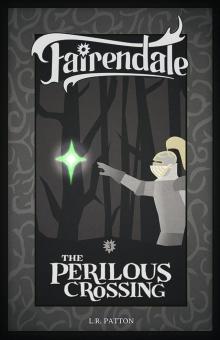 The Perilous Crossing
The Perilous Crossing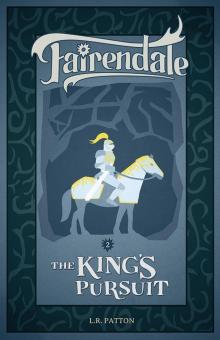 The King's Pursuit
The King's Pursuit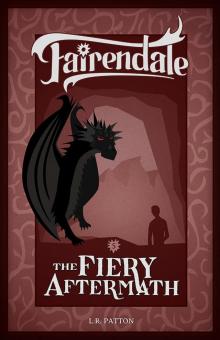 The Fiery Aftermath
The Fiery Aftermath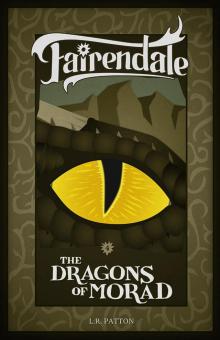 The Dragons of Morad
The Dragons of Morad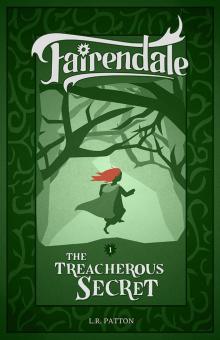 The Treacherous Secret
The Treacherous Secret